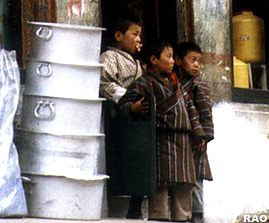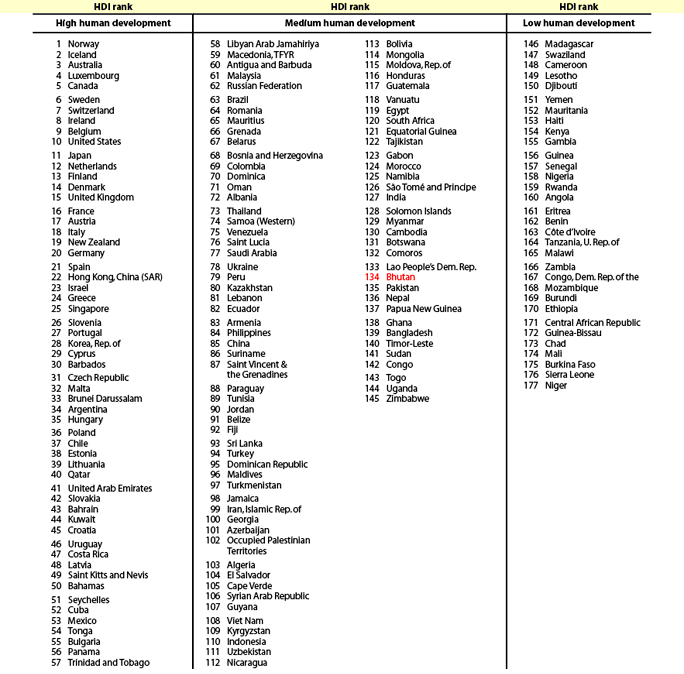 |
Bhutan's
Development |
 |
Human Development Index HDI |
 |
Bhutan's
Development |
 |
Human Development Index HDI |
| World
Bank Intl. Comparison Program ICP |
| Links |
|
|
 |
|
Human Development Reports
|
 |
|
Human
Development Index (HDI) 2006
|

|
 |
| While
Bhutan has shown a steady improvement in the global Human Development Index
(HDI) ranking in recent years, this year Bhutan's ranking fell a step back,
according to UNDP Human Development Report, 2006.
With
an overall HDI of 0.538 Bhutan was ranked 135 out of 177 countries, from
134 in 2005, according to the report which was
released, in Thimphu jointly by UNDP and the National Environment Commission. |
|
But
Bhutan's HDI value had increased from 0.536 in 2005 to 0.538 in 2006 mainly
because of increase in the life expectancy component.
A
UN spokesperson said that while HDI is valued as an important tool to analyse
trends, one has to be cautious when comparing it with HDIs in different
editions of the report.
"As
international agencies continue to improve their statistics, including
updating the data, the year to year changes in the HDI often reflects revisions
to data rather than real changes in the country," the spokesperson said.
Moreover,
most of the data were from statistics collected in 2004 or before which
implies that Bhutan's data, in some cases, is not in line with the national
estimates. For instance, life expectancy rate, according to national data,
is 66.1, against 64 as reflected in the report.
"This
indicates that there is need to work on more updated data for Bhutan by
using the census 2005 results," said the spokesperson.
This
year, there is a shift in positions among the SAARC countries, which are
grouped in the Middle Human Development category among 83 countries.
 |
| While Bhutan
ranks low at 72 with Nepal and Bangladesh closely behind, Pakistan
has moved a step ahead at 71. Sri Lanka, which leads the region in the
global index, has moved up six steps from 96 in 2005. India and Maldives
have moved up seven and four steps respectively.
There
is also a major shift in positions at the top. While Norway still holds
the league, Ireland has replaced Luxembourg to take the fourth place, pushing
the latter down the line at 12th position. Ranking fifth, Sweden replaces
Canada to be on the top five. The United States, the world's largest economy,
has moved up two steps from 11th position in 2004. |
|
The
report states that, as with any index that aggregates data across several
areas of achievement, the HDI is also subject to change given the shifts
in statistical reporting systems. "In some cases these shifts can affect
a country's ranking in either a positive or negative direction, regardless
of underlying performance," states the report.
The
report elaborates that some 32 countries have, in the past, included adult
education when reporting school enrolment. "By definition the school enrolment
data used in the HDI should not include adult education. This has been
rectified and this could mean that most countries would have an adverse
effect on the HDI ranking," states the report.
The
HDI, an integral part of the report, ranks countries based on wider issues
of human development like life expectancy, school enrolment and literacy,
rather than just the income.
A
composite measure, the HDI focuses mainly on three measurable dimensions
of human development - living a long and healthy life, being educated and
having a decent standard of living that clearly shows the distinction between
income and human well-being.
The
HDI, this year, highlights the large gaps in well-being and life chances
that continue to divide the interconnected world. The word "global village",
states the report, does not hold true when inspected through the lens of
human development. "It appears deeply divided between the streets of the
haves and the have nots," the report states.
The
report also states that HDI rank does not always depend on income rank
or vice versa. The United States, whose citizens are on average the second
richest in the world after Luxembourg, stands six places lower in its HDI
rank than its income rank.
This
year's report delves in the twin themes of "water for life and livelihood",
two critical foundations for human development and one of the main MDG
targets. The report points out despite the finance, technology, and capacity
to improve things, more than one billion people are still denied the right
to clean water and 2.6 billion people lack access to adequate sanitation.
| by
Karma Choden, Kuensel, Bhutan's National Newspaper, 2006 |
 |
top
|
Human
Development Index (HDI) - Ranking 2005
|
 |
| Source:
United Nations Development Programme UNDP 2006 |
 |
 |
|
Bhutan National Human Development Report 2011
|

|
top
| Links |
 |
 |
 |
Externe Links |
 |
Asian
Development Bank ADB |
|
 |
World
Bank WB |
|
 |
| United
Nations Development Programme |
|
|
 |
| United
Nations Educational, Scientific and Cultural Organization (UNESCO) |
|
|
 |
United
Nations
Population
Division |
|
 |
United
Nations Population Division UNPOP |
|
 |
United
Nations
Organization |
|
 |
United
Nations organisation UNO |
|
|





